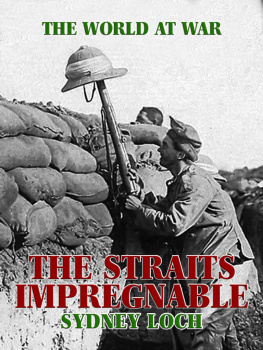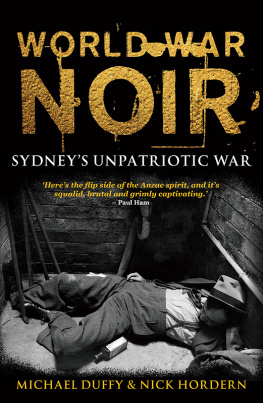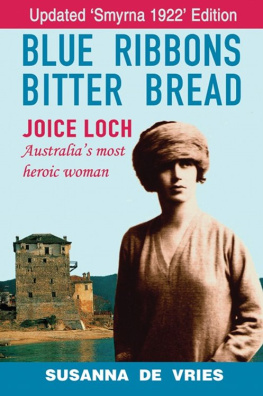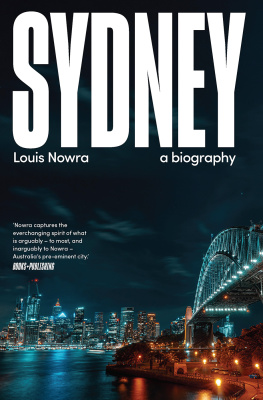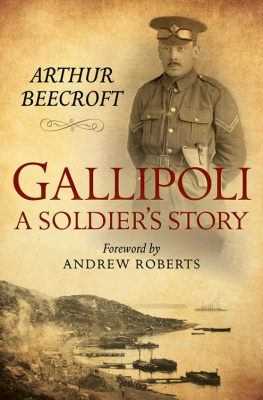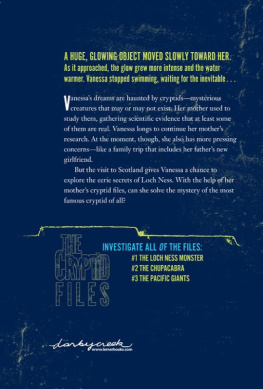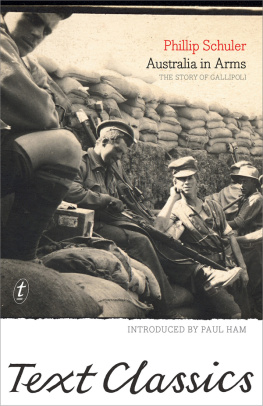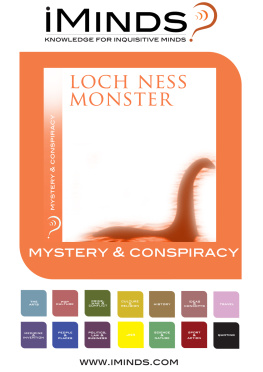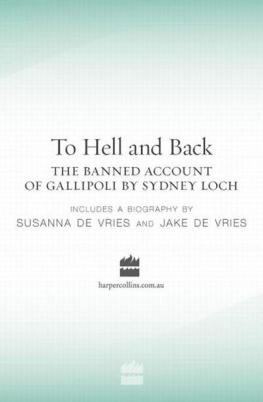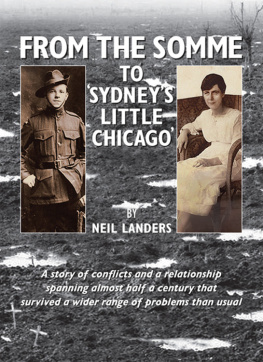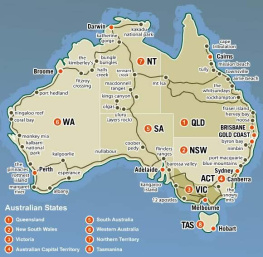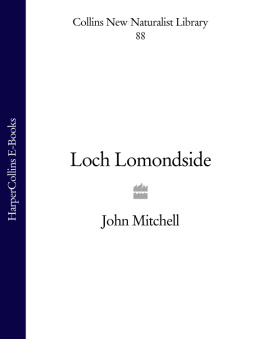The Straits Impregnable
Sydney Loch
CONTENTS
| PAGE |
| CHAPTER I |
| THE CALL |
| CHAPTER II |
| ENLISTED |
| CHAPTER III |
| TRAINING |
| CHAPTER IV |
| THE VOYAGE |
| CHAPTER V |
| IN EGYPT |
| CHAPTER VI |
| THE SOLDIERS LIFE |
| CHAPTER VII |
| THE PASSING OF WINTER |
| CHAPTER VIII |
| MUDROS |
| CHAPTER IX |
| THE LANDING IN GALLIPOLI |
| CHAPTER X |
| IN THE FIRING LINE |
| CHAPTER XI |
| ACTION FRONT |
| CHAPTER XII |
| THE DAYS BUSINESS |
| CHAPTER XIII |
| A PERILOUS EXPEDITION |
| CHAPTER XIV |
| DEATH AND THE BATTERY |
| CHAPTER XV |
| ROUTINE |
| CHAPTER XVI |
| A FLAG OF TRUCE |
| CHAPTER XVII |
| THE MARCH OF MONOTONY |
| CHAPTER XVIII |
| REALITIES |
| CHAPTER XIX |
| THE LAST OF ANZAC |
CHAPTER I
THE CALL
The afternoon was wearing out, and I began to think of home and tea. I stopped working, straightened my back, ran moist fingers through my hair, and sat down on the log. The axe went tumbling to the ground. Watch-and-pray and Wait-and-see got up from the fallen gum suckers, and trotted forward with waving tails and glistening, slippery tongues. I made haste to get rid of them. They began to play, biting ears and growling, but went back at last, laid keen black heads on narrow paws and watched me out of grave brown eyes.
To Gippsland spring had come. The day had been a day of spring until evening beckoned afternoon away. Now a little breezegentle, but rather coldcame out of the west and wandered through the tops of the gum suckers. The scent of eucalyptus came with it; and behind it followed the voices of countless rustling leaves. It moved among the wattle tops where they wound along the river; it moved across the rape crops and over the grassy flats beyond. It bent the sedges in the lagoons where the first black ducks were feeding, and where, on warmer nights, big eels bubbled below the sunken logs. I raised my forehead to the cool; and, lo! the breeze had gone!
Through the rape crop sheep were streaming. Anxious ewes pulled hurriedly at the broad green leaves or watched with care their frolicking youngsters. On the flats, round the salt trough, the bullocks chewed and meditated. Smoke climbed up by the river bend; and outside her cottage moved Mrs. Pigg, bringing in the washing, pulling vegetables, feeding the fowls. Small and busy the distance showed her.
Behind me, and on either side, the suckers pushed up their heads. High over them leaned spectral trees: blackened, leafless, stripped of bark, weary with long waiting. About the ground great trees had fallen: grim logsknotted logslogs scarred with the breath of summer fires. Here and there showed feeding sheep; and this way and that way ran well-worn pads leading to the waterholes in the wattles. Over the hillside spread a faint green carpet where was shooting the young grass.
Out from hidden gullies floated cries of sheep. Mournfully they travelled across the hillsidenow the voice of a ewe whose lamb had strayed, now a lamb hungry and alone. Other sights and sounds began to fill the evening. Small finches came hopping into the suckers, dodging and peeping and swinging through the boughs, and preening themselves between the leaves. Gay was the twittering as the hunt for supper went forward. Then a jackass swooped into a tree top, threw up tail, raised high head and pealed out frenzied laughter. Other tree tops joined the madman chorus. Next a magpie hopped upon the big log and glinted an evil eye at me; and then forgot me to ruffle sombre shoulders, and join the evening hymn.
The sun was on the horizon, and shadows moved quickly across the lower lands. First they filled the reedy lagoons, the big wattle groves, the belts of scrub. They moved from bramble bush to grass tussock, from fallen log to waterhole. Faint wisps of fog rose about the river. It was late; I was hungry; it was time for home.
I put out a hand for my coat, picking up the axe as well; and Watch-and-pray and Wait-and-see sprang forward with glad barks. I pushed them off and got up.
Hullo there, Guvnor, a harsh voice shouted from the ruined gate, and old Scottie came through the gap on his ancient chestnut mare. The long sunbeams shone upon his weather-beaten face, with its broken yellow teeth and small hard beard. He wore an ulster, with a sugar-bag hanging out of the pocket. In the bag he had dived a horny hand, and now it came out filled with letters and papers. Here you are, Guvnor, he shouted again.
I went forward and took the packet, picking out all that belonged to me. What was left I handed back. There are one or two for the Piggs, I said. You might take them over.
Right-o, sir, he answered, and pulled the old mare round, and started away at a jog-trot. Through the suckers man and beast disappearedan elderly man and a very elderly beast.
I leaned against the gateway and opened the letters. There was news from home, telling of weather five weeks old, and a garden party older yet. Still I read it all twice. An agent had written of some bullocks, and there was a third note about sheep. I pushed everything into my coat pocket, and picked up the papers. Four were thereI had not been to the township for a day or two. I opened the oldest of them, dated four days ago, and turned the pages in a hurryI was hungry and thinking of tea.
But I forgot tea. Across the middle leaves ran staring headlines. Austria was at the throat of Servia, and war was a matter of hours. All Europe was arming.
I opened another paper. Events had gone forward. Austria had begun the journey of chastisement. From East to West of Europe sounded the clamour of war. I scanned the pages, and threw the paper down. The next I opened, and again the next. No line of hope!
I leaned and read.
Dusk was deepening, and slow grey fogs wended across the flats. Watch-and-pray and Wait-and-see sat erect upon their haunches, peering up to know why I delayed. The evening had grown still again, birds and sheep alike were silent; but from the Piggs cottage smoke climbed in cheerful wreaths. Pigg and his wife were at tea now, old Scottie no doubt with them: they were talking of war and ruin, though half a world lay between.
I picked up the fallen papers and put the axe upon my shoulder. Here, Watch-and-pray, here, Wait-and-see, were off at last! I took the path through the ti-tree, though it was boggy still from the rains, and brought the dogs to heel as we passed beside the river through flocks of dozing sheep. Out of the calm skies first stars were coming. We reached the cattle-yards, and pushed a way through the loose barbed wire. The breath of honeysuckle was blown from Scotties cottage, but the place was dark and empty. Scottie had not come back.
We left the yards to go along the path which crossed the hillside; then dipped into the gully and climbed the opposite bank. The horses stood under the pepper trees in a lazy, drowsy circle. I glanced into the buggy-shed to see that all was secure. I pulled open the garden gate. It was evening now, full evening, grey and a trifle chill; and among the grasses crickets shrilled and from the waterhole by the lightwood tree rose the voices of amorous frogs.
A score of perfumes met me at the garden gate. The peaches, pears, and apples were a-flower; and the lemon trees and oranges budded. When we came to the house, I reached down the dogs meat from the shelf beside the window, and led the way to the kennels, which were among piles below the flooring. The dogs began to bark again, and ran to their places, sitting down to be chained up. I chained them, gave them their meat and a goodnight pat, and went round to the back once more.

